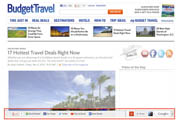By Paul Thomson :: 9:06 AM
 Robert Scoble, technology evangelist, is no stranger to trying new things and pushing the limits. Scoble is also an early adopter of Google Glass, and a participant in Google’s Glass Explorer program.
Robert Scoble, technology evangelist, is no stranger to trying new things and pushing the limits. Scoble is also an early adopter of Google Glass, and a participant in Google’s Glass Explorer program.
So, it should come as no surprise that Scoble is pushing his new Google Glass gadgetry as far as he can. And in this case, he’s pushing it right into his shower stall.
The picture above, of Scoble wearing Google Glass in his shower, was snapped for him by his wife. After being drenched in a rainstorm while wearing the high-tech specs, Scoble figured they might be water-resistant enough to wear into the shower. And, they were.
While it may seem like a parlor trick for Scoble, it does illustrate the pervasive nature of Google’s new technology. If people can wear such devices into places that were, before, considered solitary and private, they probably will. What will happen in gyms, public locker rooms, dorms? Rules and regulations will need to keep up.
Scoble raised twice as many questions as he answered by wearing Google Glass into his shower over the weekend. No doubt, the other Glass Explorers in Google’s beta program are pushing the limits just as far. Earlier last week, news broke that at least two separate developers had managed to jailbreak their Google Glass appliances. As the program continues, Google is receiving a good amount of feedback on how people use the devices in their daily life, and what they hope to do with them.
When Scoble became an Explorer, he stated that he’d probably never take the glasses off, except to lend them to other people to try out. With his shower photo, he also posted this retort – “You thought I was kidding.”
Welcome to the new generation of wearable computers, people. And watch what you do in public shower situations, you never know what people are wearing on their heads.
By Cynthia Herbert :: 11:02 AM
 Kelly Nash, a Florida sports reporter who covers the Tampa Bay Devil Rays was up in Massachusetts over the weekend, and decided to take in a Red Sox game at Fenway Park.
Kelly Nash, a Florida sports reporter who covers the Tampa Bay Devil Rays was up in Massachusetts over the weekend, and decided to take in a Red Sox game at Fenway Park.
She headed up to the stands and decided to snap a self-portrait with her phone. Nash had no idea that while taking the picture, she was nearly missed by a ball hit out over the park’s Green Monster during batting practice.
Nash told Fox’s sports channel that she wasn’t aware that she had such a close call with the ball until she sat down with her phone and went through the pictures, trying to decide which pose to upload to Instagram. In one of the shots, the baseball appears only inches behind Nash’s head.
When she posted the picture, Nash appended the following caption: Most dangerous selfie ever. That happened.”
Her amazing shot is below.

By Paul Thomson :: 8:46 AM
 Samsung today has taken the covers off of its new 7-inch tablet offering, the Galaxy Tab 3.
Samsung today has taken the covers off of its new 7-inch tablet offering, the Galaxy Tab 3.
The tablet features a slim form-factor that the company hopes will position it to compete with tablets from Amazon, Apple, and Google.
Samsung is touting the size of the tablet, and the fact that it can be held with one hand. The Galaxy Tab 3 has a thinner bezel than the previous Galaxy Tab 2 offering.
It is powered by a 1.2GHz Dual Core processor, and comes available with either 8GB or 16GB of internal storage, and can expand with up to 64GB of memory. It is running Android 4.1 (Jelly Bean) as the OS. It features two cameras on board, the rear-facing camera is 3-megapixels, and the front-facing one is 1.3 -megapixels.
The Galaxy Tab 3 will come in both Wi-Fi and 3G flavors. The Wi-Fi version will be available worldwide beginning next month, and the Wi-Fi with 3G version will be introduced in June. Availability depends on local markets.
Pricing information for the Galaxy Tab 3 has yet to be released.
Full specs are below:
|
Network |
WiFi3GÂ
– 3G : HSPA+21 / 5.76 Quad 850/900/1900/2100 – 2G : EDGE/GPRS Quad 850/900/1800/1900
|
|---|---|
|
Processor |
1.2 GHz Dual Core processor |
|
Display |
7 inch WSVGA(1024 x 600, 169 PPI) TFTÂ |
|
OS |
Android 4.1 (Jelly Bean) |
|
Camera |
Main(Rear): 3-megapixel cameraSub (Front): 1.3 -megapixel camera  |
|
Video |
Codec: MPEG4, H.264, H.263, WMVPlayback: 1080p Full HD @30fps |
|
Audio |
Codec: MP3, OGG, AC3, AAC, AAC+, eAAC+, WMA, WAV, FLAC |
|
ServicesÂ
& Additional
Features |
Samsung Apps |
|
Samsung Hub*
– Music Hub/ Game Hub/ Video Hub/ Learning Hub |
|
| Samsung Kies, Samsung Kies Air (Downloadable via Samsung Apps) | |
|
Samsung ChatON mobile communication service |
|
|
Google Mobile Services: Google Search, Gmail, Google Play Store, Google Plus, YouTube, Google Talk, Google Maps (Turn-by-turn Navigation), Google Now |
|
|
Connectivity |
WiFi a/b/g/n (2.4/5GHz), WiFi Channel Bonding, WiFi Direct
Bluetooth® 3.0 USB 2.0 |
|
GPS |
A-GPS + GLONASS |
|
Sensor |
WiFi: Accelerometer, Geo-magnetic, Light
3G: Accelerometer, Geo-magnetic, Light, Proximity |
|
Memory |
8/16GB Internal Memory + 1GB (RAM)
microSD slot (up to 64GB) |
|
Dimension |
111.1 x 188.0 x 9.9mm
302g(Wi-Fi), 306g (3G) |
|
Battery |
Standard battery, Li-ion 4,000 mAh |
By Cynthia Herbert :: 6:58 AM
 A new high-tech drinking glass introduced by Budweiser allows drinkers to automatically add fellow bar-mates to their Facebook friends list with a clink of the glasses.
A new high-tech drinking glass introduced by Budweiser allows drinkers to automatically add fellow bar-mates to their Facebook friends list with a clink of the glasses.
The new Budweiser contraptions, called “Buddy Cups” are currently only available in Brazil. They are pre-programmed with your Facebook details, and when you and a new friend tap the glasses together in a toast, a friend request is sent to connect you on the popular social network. An LED light on the side of the mug confirms that electronic details have been exchanged.
Budweiser will introduce the cups across Brazil at venues and events that it sponsors, such as concerts, festivals, and parties. The concept was developed by ad agency Agencia Africa and Brazil creative studio Bolha.
It is not known if the brewer has plans to expand the technology outside of Brazil at this time.
See below for video of the connective cups in action.
By Gilbert Falso :: 6:23 AM
 Google is shuttering another service soon – the Meebo Bar publishing tool is next on the company’s chopping block.
Google is shuttering another service soon – the Meebo Bar publishing tool is next on the company’s chopping block.
The Meebo bar sits at the bottom of a website, and allows website visitors to share the page via different social networks. It operates as a JavaScript plug-in.
Meebo was acquired by Google in 2012 for around $100 million.
Google made the following statement about the removal of support for Meebo: “We have decided to focus our resources on initiatives like the recently launched Google+ Sign-In (which includes interactive posts and over-the-air app installs) and the Google+ plug-ins.”
The company is urging website publishers who have installed the Meebo code on their sites to remove it by June 6 – the day it will no longer be supported.